ABM Archive Website
THIS WEBSITE CONTAINS ARCHIVE MATERIALS FOR HISTORICAL REFERENCE ONLY
For up-to-date information, including our latest appeals, news, and resources, please visit our current website.
Pamua Water Project in the Solomon Islands
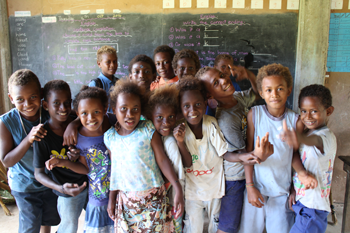 |
| Pamua Primary School students. © ABM/Jess Sexton 2014 |
Jessica Sexton, ABM’s Solomon Islands Program Officer, shares her story from a monitoring trip in October 2014.
The main purpose of the trip was to visit Pamua Secondary School on the island of San Cristobal, or as the locals call it, Makira. ABM has been helping to implement a water and sanitation project at the school, with funds kindly donated by Shore Sydney Church of England Grammar School.
Makira is the largest island of Makira-Ulawa Province in the Solomon Islands, situated east of Guadalcanal and south of Malaita, in the diocese of Hanuato’o. From the main capital of Kira Kira, Pamua is about an hour’s drive along deeply rutted dirt roads hugging the coastline, lined with lush tropical vegetation and palm trees.
At Pamua Secondary School, Jessica spoke of her special welcome:
“The school had prepared a traditional warriors’ welcome, with around six teenage boys slathered in mud and sporting spears, machetes, bows and arrows. They were quite an intimidating sight, and kept leaping with their weapons and screaming loudly. It was a good thing I was forewarned! You could tell they were having fun though, and soon the screaming turned into dancing as we entered the hall of assembled students, all ready and waiting for the official welcome ceremony to begin.”
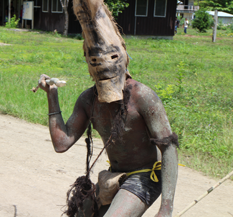 |
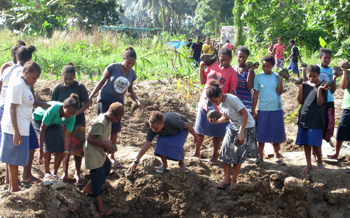 |
| Warriors’ welcome at Pamua. © ABM/Jess Sexton 2014 |
Students helping with the bore hole. © John Wesley 2014 |
In the initial phase of this project, ABM is supporting a new water source for 800 students from Pamua Primary and Secondary Schools, as well as for the Pamua Rural Training College (RTC). At the moment, their small supply of water comes from a dam further up the hill, but this is located on adjacent land, which is somebody else’s property. Access is therefore difficult, and there often isn’t enough water for everybody during the dry season. Through the Anglican Church of Melanesia (ACOM), ABM is helping to install this second water source so that the school will always be in supply.
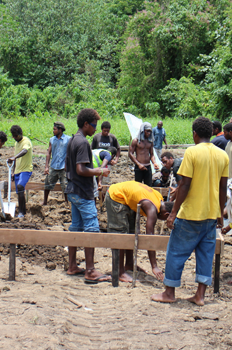 |
| Construction of the water pump house in Pamua. © ABM/Jess Sexton 2014 |
Jessica says, “The project has been very well managed through ACOM and the teachers of the Rural Training College, and is set to be completed early next year. Both the staff and students have been enthusiastically involved, helping in whatever way they can, whether it’s been filling up the bore hole with stones or contributing expertise and skill. The RTC has used the project as a teaching exercise, with students constructing the house for the water pump and the supports for the water tanks under direction from the RTC staff.
“Everyone was very appreciative. They expressed thanks for the funds that have been donated and the organisation behind the project. It felt like a privilege to be part of this work.”
In an address to the assembly, Jessica spoke of the right of every human being to have access to clean water, and thanked the students and staff for their contributions toward the success of this project. She also spoke of the source of the funding, and how it was school students like them in Australia who wanted to give generously in order to help. In this way, each person had their part to play, and the love of God displayed through every contribution made.
After this initial phase is complete, there will hopefully be a second phase, depending on funding. This will concentrate on sanitation facilities such as toilets and proper shower recesses for the students. At the moment there are no toileting facilities at all in Pamua, which is dangerous to the health of the students and teachers, all of whom live in boarding houses at the school. With the second phase, we can also run WASH (water, sanitation and hygiene) education sessions, educating the students and teachers about proper hygiene practices.
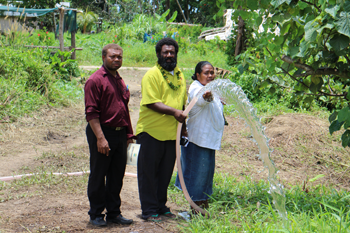 |
||
| RTC Acting Deputy Principal (middle), Peter Usumae and wife Anna show water coming from the bore hole. © ABM/Jess Sexton 2014 |
< Back


